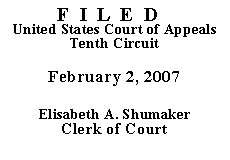

| UNITED STATES OF AMERICA, |
|
| v. | |
| TIMOTHY DEMETRIUS STONE, a/k/a MICHAEL LANDON ALEXANDER, |
|
Michael Landon Alexander appeals the district court's revocation of his supervised release, contending that revocation of supervised release without the benefit of a jury trial is unconstitutional in the wake of United States v. Booker, 543 U.S. 220 (2005). He also challenges the constitutionality of his re-imprisonment after the revocation. We affirm.
On April 26, 1991, Mr. Alexander was convicted for possession with intent to distribute cocaine base, in violation of 21 U.S.C. § 841(a)(1). The District Court of the Central District of California sentenced him to 151 months imprisonment, to be followed by five years of supervised release. After Mr. Alexander served the term of imprisonment and while he was serving the term of supervised release, jurisdiction of the case was transferred from the Central District of California to the Western District of Oklahoma. At that time, Mr. Alexander was in state custody awaiting trial on new charges.
On September 4, 2004, the United State Probation Office filed a Petition for Warrant of Summons For Offender Under Supervision, alleging that Mr. Alexander violated the terms of his supervised release. Specifically, the warrant asserted he (1) committed burglary, kidnaping and domestic assault involving his then-girlfriend, (2) failed to report to the Probation Officer, (3) failed to notify the Probation Officer of his arrest, and (4) failed to report for a drug test.
Mr. Alexander remained in state custody on state charges until March 7, 2005, at which time the state charges against him were dismissed because the complaining witness could not be located. On March 10, 2005, a Second Amended Petition for Warrant of Summons for Offender Supervision was filed, alleging the same violations. The Second Amended Petition included another violation, that of a conviction for driving while impaired. Mr. Anderson moved to dismiss this petition and raised his Booker-related claims. On March 24, the district court held a final revocation hearing at which it rejected Mr. Alexander's Booker challenge, revoked his supervised release, and ordered him to be imprisoned for a term of thirty months, with credit for the time he spent in state custody for the same conduct alleged in the petition.
On appeal, Mr. Alexander contends the district court's revocation of his supervised release required him to return to prison without a jury having found the facts necessary for the revocation, i.e. whether he violated the rules of his release. He claims the absence of jury findings constitutes a violation of his Sixth Amendment rights under Booker.
We settled this issue in United States v. Cordova, 461 F.3d 1184, 1186 (10th Cir. 2006), where we said "[i]t is well-settled that supervised release is part of the penalty for the initial offense, and that once the original sentence has been imposed in a criminal case, further proceedings with respect to that sentence have not been subject to Sixth Amendment protections." (internal citation and quotations omitted). This is so because
[w]hen revoking supervised release the district judge is not resentencing the defendant. The type and the term of the sentence has already been determined by the sentencing judge. The supervising district judge is bound by the sentence previously imposed, and at revocation is merely converting all or a portion of the supervised release period into a term of imprisonment.
United States v. Tsosie, 376 F.3d 1210, 1216 (10th Cir. 2004).
In finding no Sixth Amendment violation in Cordova, we adopted the Second Circuit's reasoning:
[I]t is evident that the constitutional rights afforded a defendant subject to revocation of supervised release for violation of its conditions are not co-extensive with those enjoyed by a suspect to whom the presumption of innocence attaches. Given a prior conviction and the proper imposition of conditions on the term of supervised release, when a defendant fails to abide by those conditions the government is not then put to the burden of an adversarial criminal trial. Instead, there is, as in this case, a revocation of release hearing at which, as the Supreme Court instructs, neither the right to a jury trial, nor proof beyond a reasonable doubt is required. As the Supreme Court has explained in the context of parole, such proceedings arise[ ] after the end of the criminal prosecution, including imposition of sentence Revocation deprives an individual, not of the absolute liberty to which every citizen is entitled, but only of the conditional liberty properly dependent on observance of special parole restrictions.
. . . .
There is no reason why the conditions of supervised release, which uncontroversially deprive the convicted of substantive constitutional rights, cannot also deprive the defendant of certain procedural constitutional rights for a specified term and under specific circumstances. In other words, it is of no constitutional concern that the conditions placed on a defendant's liberty in supervised release encompass by implication the additional condition expressed in § 3583(e)(3): that the defendant surrender his rights to trial by jury and to having accusations against him proved beyond a reasonable doubt.
Id. 461 F.3d at 1188 (internal citations and quotations omitted).
In sum, Mr. Alexander's Sixth Amendment right to a jury trial was not violated when his supervised release was revoked based on facts found by the district court by a preponderance of the evidence. We AFFIRM the district court's decision to revoke Mr. Alexander's supervised release and to order an additional term of imprisonment.
ENTERED FOR THE COURT
Stephanie K. Seymour
Circuit Judge
*.This order and judgment is not binding precedent, except under the doctrines of law of the case, res judicata, and collateral estoppel. It may be cited, however, for its persuasive value consistent with Fed. R. App. P. 32.1 (eff. Dec. 1, 2006) and 10th Cir. R. 32.1 (eff. Jan. 1, 2007).